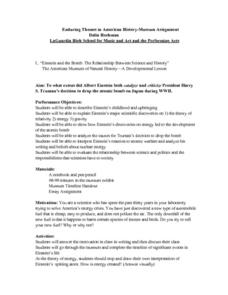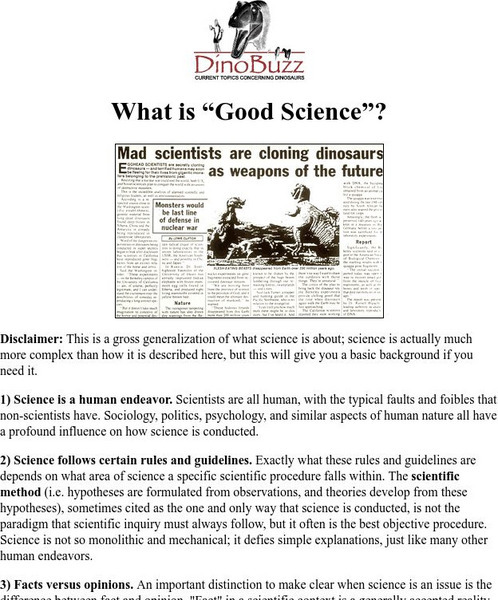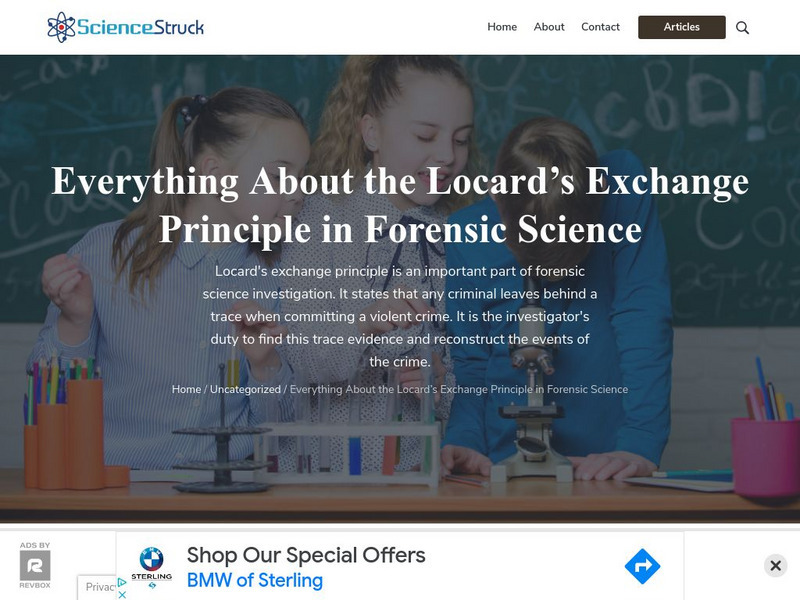Curated OER
Enduring Themes in American History-Museum Assignment
Young scholars study and research the life of Albert Einstein. They focus on the extent Albert Einstein catalyzed and criticized President Harry S. Truman's decision to drop the atomic bomb on Japan during WWII. Students answer a...
Curated OER
Interior of the Earth
Sixth graders identify and describe the composition and physical properties of the layers of the Earth. They also explain how scientists used the scientific process to know about the center of the Earth. Finally, 6th graders read a...
Curated OER
Blending Fiction and Nonfiction to Improve Comprehension and Writing Skills
Learners explore a content area by reading both fiction and nonfiction texts on the topic. They do more research online about the topic. After comparing the texts, they create their own written original work, using both narrative and...
University of California
Ucmp: What Is "Good Science"?
A very good explanation of the scientific process and the differences between science and non-science. This is a concise and clearly written description.
Science Struck
Science Struck: What Is Gravity and How Does It Work
A very detailed look at gravitational force and the many theories that have been put forward to try to explain it. Includes lots of illustrations.
CK-12 Foundation
Ck 12: Fourth Grade Science: Earth Science: Theory of Plate Tectonics
[Free Registration/Login may be required to access all resource tools.] Discusses what a tectonic plate is and how scientists can recognize its edges, how the plates move by convection in the mantle, the three types of plate boundaries...
NASA
Nasa: Space Place: What Is Science?
Students learn abut scientific investigation and the difference between hypotheses and theories.
University of California
Understanding Science: Science at Multiple Levels
Describes how the process of science works the same whether at the microscopic level or over a long period time. Clearly explains what a theory and a hypothesis are, and what an over-arching theory is.
CK-12 Foundation
Ck 12: Life Science: Scientific Theories
[Free Registration/Login may be required to access all resource tools.] Today most people realize that microorganisms, such as bacteria or viruses, are the cause of disease. This concept is known as the germ theory of disease, one of the...
Khan Academy
Khan Academy: What Is the Maxwell Boltzmann Distribution?
In a gas, there are lots of molecules traveling at lots of different speeds. Here's a framework for thinking about that.
Khan Academy
Khan Academy: What Is the Ideal Gas Law?
Learn how pressure, volume, temperature, and the amount of a gas are related to each other.
TED Talks
Ted: Ted Ed: What's the Difference Between a Scientific Law and Theory?
What is the difference between a theory and a law, and is one better? Matt Anticole shows why science needs both laws and theories to understand the whole picture. [5:12]
Science Struck
Science Struck: The Theory of Continental Drift
Explains what is meant by the Theory of Continental Drift, its earliest proponents, the stages of continental drift, the causes related to tectonic plate movement, the evidence that has been found, and how the Himalaya Mountains offer...
Science Struck
Science Struck: Ecological Systems Theory Simply Explained
Explains what the ecological systems theory is and it relates to child development. Looks at five environmental contexts that impact on a child's life and development. Provides examples of how different events within these frameworks...
Simon Fraser University
Chem1 Virtual Textbook: What Is Pseudoscience?
Pseudoscience studies various fields of science that make claims to be legitimate, but researchers and academics argue that pseudoscientific discoveries do not hold up to typical standards of testing and proof. Examples are the Lunar...
Symmetry Magazine
Symmetry Magazine: Explain It in 60 Seconds: A Theory
The definition of a theory as it applied to science is explained in this brief article. "Explain It In 60 Seconds" is an article series that aims to summarize in a few paragraphs the meaning of different concepts in particle physics.
Science Buddies
Science Buddies: Testing Behavioral Incentives
Research has shown that positive reinforcement is an effective means of influencing behavior. This experiment looks further to determine which type of reinforcement-praise or reward-is more effective with young children. The objective of...
Science Buddies
Science Buddies: What's the Fastest Way to Cool a Soda?
When you are craving an ice cold drink of soda, the last thing you want is to be stuck with a bunch of soda cans at room temperature. This fun science experiment sends you on a discovery to find the fastest way to cool soda with...
Science Struck
Science Struck: The Theory of Environmental Determinism
Explains what is meant by the theory of environmental determinism, its origins and history, and its decline in popularity. Also presents examples of environmental determinism.
Science Struck
Science Struck: Does the Fourth Dimension of Time Exist?
A decent explanation of the concept of time as the fourth dimension. The author discusses Einstein's theory of special relativity and the idea of space-time.
Utah Education Network
Uen: Universe Devlopment What Is the Big Bang?
If you need a model of the big bang theory, then check out this resource. Using just a balloon and a marker, you can create a model of the big bang process.
University of California
Q Files: Misconceptions About Science
Many students have misconceptions about what science is and how it works. This module explains and corrects some of the most common misconceptions that students are likely having trouble with.
CK-12 Foundation
Ck 12: Physical Science: Wave Particle Theory
[Free Registration/Login may be required to access all resource tools.] The wave-particle theory and what a photon is, and evidence that electromagnetic radiation is both a particle and a wave.
Science Struck
Science Struck: Locard's Exchange Principle in Forensic Science
'This resource describes some of the history of forensic science and what Locard's Exchange Principle is and how it is applied. Discusses the different types of trace evidence that investigators look for and some drawbacks of Locard's...

















